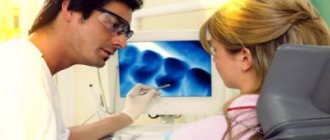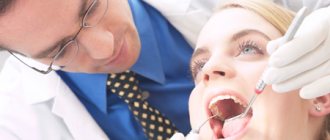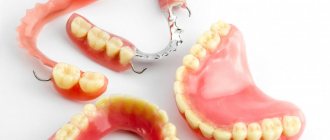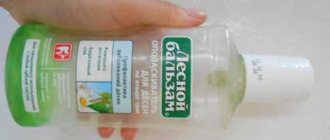20.11.2019
Healthy teeth enable a person to chew food and eat normally. Often during pregnancy, women experience a problem - increased sensitivity of the teeth, which brings severe discomfort. This happens because the entire body begins to work under increased stress. Teeth are an indicator by which one can determine the weakness of the body’s immune system against the background of a hormonal surge and a lack of calcium.
Tooth sensitivity as a sign of pregnancy
During pregnancy, a young mother's hormonal levels completely change, which can cause tooth sensitivity. A woman carries a child under her heart, and this requires an increased dose of vitamins, microelements and minerals, the lack of which can cause serious diseases.
It is worth remembering that dental treatment with certain drugs is prohibited for pregnant women. You need to visit the dentist for treatment or removal of teeth within a strictly defined period, so as not to harm the unborn child. In this situation, you need to take vitamin complexes and take preventive measures to reduce the sensitivity of tooth enamel.
How to treat during pregnancy
During pregnancy, it is allowed to have teeth filled and even have them removed. Dental fillings during pregnancy are carried out according to the standard procedure. Modern materials from which fillings are made do not cause any harm to either the mother or the child.
Painful procedures, including tooth extraction, are performed under local anesthesia. The anesthetic drug is chosen very carefully. The dentist must be familiar with the timing of pregnancy and contraindications in order to select the drug that is most suitable for a particular patient.
X-rays should be taken very carefully during pregnancy. If you cannot do without it during dental treatment, then it is best to take the photo in a modern dental clinic with equipment that meets high international standards. To further protect the woman and fetus from X-rays, the chest, pelvis and abdominal area are covered with a special fabric during the X-ray.
Dentists say that it is best to treat teeth during pregnancy in the second trimester. This is a period of relative calm between the critical points of pregnancy in the first trimester (when the fetus is just beginning to develop) and in the third trimester (when the fetus is almost fully formed).
Causes of hyperesthesia
Carrying a child is a difficult period for the body, contributing to the exacerbation of various types of diseases. Hormonal changes begin, there are not enough minerals and vitamins and, as a result, the body’s immune system as a whole weakens. At this time, every woman should pay special attention to the health of her teeth and oral cavity - the health of the mother’s body largely depends on this.
And if some people think that tooth sensitivity is not a terrible disease, then they are mistaken. Often these symptoms indicate more serious deviations in the health of the expectant mother than simple thinning of the enamel on the teeth. Let's look at the reasons why tooth enamel can become hypersensitive:
- Increased blood circulation. The body makes every effort to deliver oxygen and nutrients to the fetus in a timely manner. In this case, a woman may experience swelling of the gums and painful sensations in the oral cavity when eating. Blood circulation can cause such an effect as a strong reaction of tooth enamel to cold or hot.
- Restructuring of hormonal levels. This process affects the immune system as a whole, making it weak. Nature has provided for this process so that the body does not begin to reject the child, considering it a foreign body. It is during this period that the expectant mother’s body is attacked by bacteria, viruses and harmful microbes. At this time, periodontal disease and caries often begin to develop.
- Oral diseases. A pregnant woman is vulnerable to pathogenic bacteria, which primarily affect the oral cavity, causing dental diseases. Sensitivity of tooth enamel is the mildest form of deviation, which should be immediately addressed.
As soon as the expectant mother experiences symptoms of hyperesthesia, immediate measures must be taken to eliminate them. Lack of proper treatment can lead to serious complications such as bleeding gums and oral infections.
Do not forget that pregnancy is a period when the use of drugs for treatment is greatly limited. During certain periods of pregnancy, even doctors cannot always intervene in the course of the disease without harm to the fetus.
Features of oral hygiene in pregnant women
24.Jul.2017
During pregnancy, problems with the oral cavity increase the risk of developing various diseases for the expectant mother and baby. This can seriously affect the formation of the child’s vital systems. Bacteria that accumulate in the oral cavity enter the gastrointestinal tract. As a result, the immune system of the entire body is weakened. Frequent colds may appear, cardiovascular diseases begin to develop, and problems with the digestive organs arise.
Teeth during pregnancy: first visit to the dentist
Ideally, dental problems should be resolved before the planned pregnancy. But not everyone succeeds in this.
During pregnancy, it is better to postpone serious manipulations, such as caries treatment with anesthesia. Instead, talk to your doctor about the best toothpaste to use to stop tooth decay. In the case of deep damage to the tooth and the need for depulpation (removal of the nerve), you may be offered to install a temporary filling. In the first trimester, dental treatment during pregnancy should be as gentle as possible.
Teeth during pregnancy: treatment and prevention
A very important procedure during pregnancy is professional teeth cleaning. As a rule, the procedure lasts no more than 40 minutes. During this time, the dentist will have time to remove old tartar and plaque. Using special pastes and brushes, he will polish your teeth and cover them with protective varnish. The surface of the teeth will become clean. Smooth enamel will protect you from the new danger of developing caries.
During pregnancy, whitening procedures should not be performed. Teeth whitening comes with the risk of damaging the enamel. In most cases, this is contraindicated during pregnancy, when the load on the enamel is already increased. Teeth become especially sensitive during pregnancy, and the already unpleasant sensations can become very painful.
The second trimester of pregnancy is a suitable period for the treatment of shallow caries and gum inflammation. By this time, all the baby’s main organs have already been formed. The use of mild medications will not cause serious harm.
Teeth during pregnancy: smile more often!
Expectant mothers should choose brushes with medium-hard bristles. This will protect not only the gums from excessive bleeding, but also the sensitive enamel from micro-scratches. You will have to change your brushes more often than before, preferably every month. Your dentist will help you choose the right toothpaste.
A very useful item for comprehensive oral care is an irrigator. With its help, you can more thoroughly clean the hard-to-reach spaces between your teeth. The irrigator perfectly massages the gums, which is the best prevention against gingivitis, which often occurs in expectant mothers. The reason lies in hormonal changes. At the end of the first trimester, if the blood supply to the skin and mucous membranes deteriorates, the gums may suffer. If you notice swelling, bleeding, or pain, you should consult a doctor. In most cases, it will be enough to rinse your mouth with a medicated solution at home, apply ointment to the affected areas and use a soft-bristled brush.
Teeth during pregnancy: proper nutrition
To keep teeth healthy, the expectant mother must monitor her diet during pregnancy. A simple adjustment to your daily diet will do wonders.
Keeping a food diary is very useful. After finishing each meal, write down what you ate and drank in a notebook. At the end of the week, look through your diary and analyze how much protein, carbohydrates and fat you usually eat. You don't have to be a nutritionist to know if you're eating right. By eating a lot of baked goods, you end up with excess carbohydrates. And a lack of red meat, eggs, fish, and dairy products in the diet is a clear sign of an unbalanced diet.
| Dentist visit schedule: 1st visit: 6-9 weeks of pregnancy 2nd visit: 16-18 weeks of pregnancy 3rd visit: 26-28 weeks of pregnancy 4th visit: 36-38 weeks of pregnancy |
Teeth during pregnancy: mouth rinse
Make a decoction of string, chamomile, calamus and licorice rhizomes: place two tablespoons of the mixture in a saucepan, pour two cups of boiling water and simmer over low heat for 15 minutes. Strain and dilute with water to make a glass of liquid. Use after meals to treat and prevent gingivitis.
Symptoms
Hyperesthesia is an instant, painful reaction of teeth to external stimuli:
- cold or hot food;
- air temperature changes;
- sour or sweet drinks;
- spicy or salty foods.
The reaction begins quickly and is accompanied by acute, unbearable pain, but as soon as the stimulus is eliminated, the pain immediately subsides.
Let's figure out what can happen if this disease is not treated in a timely manner:
- Increased pain that will continue regardless of the presence of an irritating factor.
- The list of irritants can grow greatly.
- The spread of hyperesthesia to a large number of teeth, it can develop into a systemic stage.
- The appearance of frequent headaches.
Features of treatment of tooth sensitivity during pregnancy
Pregnancy is a period when you need to approach the treatment of any disease with extreme caution. Not all drugs can be used without harming the baby. Dental treatment is no exception. Let's look at specific deadlines.
1st trimester
During this period, the internal organs and tissues of the unborn baby are formed. This is one of the difficult periods for a woman, as she experiences dizziness, nausea, increased salivation, and heartburn. From 1 to 13 weeks, it is strictly not recommended to treat teeth. You can visit the dentist for a professional examination, hardware teeth cleaning, but nothing more. At this moment, any manipulations using immunomodulators or enamel-strengthening drugs are not carried out.
2nd trimester
During this period of pregnancy, the expectant mother experiences emotional calm, general well-being is observed - the fetus is developing intensively. From 14 to 27 weeks, in addition to preventive measures, treatment is prescribed if necessary. Any dental treatment methods at this time will be safe for the baby.
3rd trimester
From the 28th week, all manipulations aimed at dental treatment are stopped and postponed until after childbirth. The uterus is very sensitive during this time period, and such a stressful situation as treatment can provoke premature birth. Therefore, only prevention.
What dental treatment is prohibited during pregnancy?
When treating teeth during pregnancy, you need to know what is strictly prohibited for expectant mothers.
As a substance for local anesthesia, it is prohibited to use those compositions that contain adrenaline and any of its derivatives. General anesthesia during pregnancy is also strictly prohibited.
Teeth whitening is prohibited. Dental prosthetics cannot be performed. It is prohibited to perform dental treatment using arsenic during pregnancy. Dentists are aware of all the restrictions and your task, in case your pregnancy is short, is to warn the doctor about pregnancy before starting dental treatment.
Folk remedies for tooth sensitivity during pregnancy
Traditional medicine, based on the use of decoctions and infusions of natural herbs, will not harm either the expectant mother or the baby. To reduce tooth sensitivity, you can use the following recipes, tested by our grandmothers:
- Milk is a product rich in calcium, which a pregnant woman greatly lacks during this period. It should be drunk warmed, holding it in the mouth for 20 seconds.
- Tea tree oil will not only help cope with tooth sensitivity, but also remove bad breath. To do this, take a glass of warm water, place 3 drops of oil there, and stir. The composition is used to rinse 3-4 times during the day.
- Table salt also helps strengthen tooth enamel. Dissolve a teaspoon of table salt in a glass of water at a comfortable temperature and rinse your teeth after each brushing.
- Pharmaceutical chamomile is an excellent soothing, antibacterial, and analgesic. To rinse the mouth, prepare an infusion: pour a tablespoon of herb with 1 cup of boiling water and leave for 1 hour. You should rinse your teeth at least 5 times a day.
- A decoction of burdock herb can reduce sensitivity and freshen breath. Prepare the decoction as follows:
- put a container with 250 ml of water on the fire;
- bring to a boil and add 1 teaspoon of herbs, boil for 3 minutes;
- the decoction removed from the heat should sit for an hour;
- strain the broth and rinse your teeth twice a day.
To improve the condition of the gums and ensure good blood flow to them, you can perform a daily massage. It's done with your fingers.
These recipes are great for maintaining oral and dental health. Often after the birth of a child, such a nuisance as hypersensitivity of tooth enamel goes away without intervention. But it’s not worth it, if you eat at random and endure pain every day, go to the dentist.
How does pregnancy affect teeth?
Ideally, the expectant mother should plan her conception and at this time eliminate all dental pathologies. But even in this case, problems can arise at any time.
This is due to powerful changes in the body:
- immunity decreases, which suppresses the activity of pathogenic bacteria;
- the composition of saliva changes - due to increased viscosity, it protects less well from pathogenic microorganisms and poorly enriches the enamel with minerals;
- the body lacks calcium and magnesium, so bone tissue becomes more fragile;
- soft gum tissues become loose and prone to infections.
For these reasons, patients develop caries, gingivitis, periodontitis, periodontal disease, and epulis. It is impossible to spread infectious diseases, because pathogenic microflora easily penetrates the blood, which means it can infect the fetus and lead to developmental abnormalities. At the first signs of disturbances, you should immediately contact a dentist, who will decide how best to cope with this or that disease.
Preventive measures
Prevention is preferable to treatment. To prevent such an unpleasant symptom as dental hypersensitivity from bothering you, just do the following:
- Introduce foods rich in vitamins C and D, magnesium, calcium and phosphorus into your diet.
- Strengthen your immune system.
- Avoid foods that contain a lot of acid.
- To brush your teeth, use soft-bristled toothbrushes and preventive toothpastes.
- Do not use whitening pastes.
- Remove tartar at the dentist regularly, avoiding large deposits.











